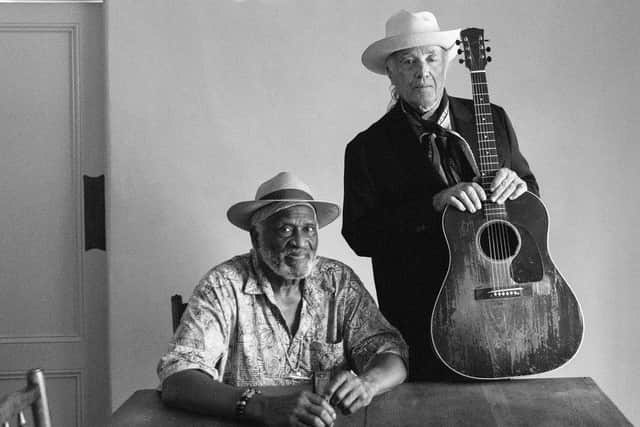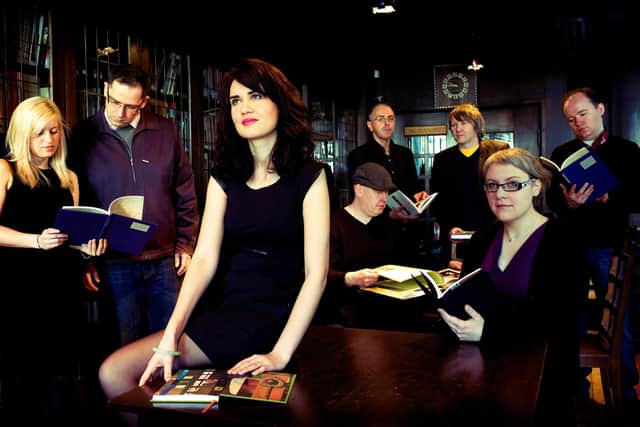Album reviews: Father John Misty | Taj Mahal & Ry Cooder | Happy Particles | Butcher Boy


Father John Misty: Chloe and the Next 20th Century (Bella Union) ****
Taj Mahal & Ry Cooder: Get On Board: The Songs of Sonny Terry & Brownie McGhee (Nonesuch) ***
Advertisement
Hide AdAdvertisement
Hide AdHappy Particles: Every Room In My House Is In Darkness (Bleary) ***
Butcher Boy: You Had a Kind Face (Needle Mythology) ****
After ten years in the musical guise of Father John Misty, Josh Tillman lays aside the eloquent self-loathing and much of his caustic cultural commentary for an old-fashioned big band album. Chloe and the Next 20th Century mercifully eschews the finger-clicking Sinatra swing pretensions of many a pop star indulgence but that doesn’t mean there is not a touch of Tin Pan Alley or Cole Porter in the romantic subject matter or the lush arrangements of his compadre Jonathan Wilson, both showcased on Kiss Me (I Loved You)’s appeal to rekindle an old love.
At times, the music is almost perversely middle of the road – or end-of-the-pier in the case of the organ/vibraphone combo on opening track Chloe, a jazz age tea dance in the Blackpool Tower ballroom beamed in via Laurel Canyon, Los Angeles. Goodbye, Mr Blue makes no secret of its debt to the mellow country rock of Glen Campbell and Harry Nilssen, with the sighing strings and gentle twang of guitar softening its portrait of troubled domesticity.
Elsewhere there is a certain Gallic flair to the baroque pop of Q4 and a Latin twist to the cocktail lounge exotica of Olvidado (Otro Momento). Delicate pizzicato strings and yearning trumpet accompany the romantic crooner tune Funny Girl while Only a Fool is an almost cutesy easy listening sashay.


However, Father John Misty has not entirely drawn in his claws. The album bows out in style on The Next 20th Century, a quiet seven-minute epic, with Tillman’s expressive voice to the fore on a widescreen socio-political rumination, dappled with cultural references, orchestral percussion, stealthy strings and a burst of badass rock-out guitar.
Blues buddies Taj Mahal and Ry Cooder, who first played together as The Rising Sons in 1965, reunite for the first time in 50 years to celebrate their favourite blues duo of guitarist Brownie McGhee and harmonica player Sonny Terry. Mahal describes their Piedmont blues style as “the south on steroids”. He and Cooder throw in mandolin, banjo and piano, while Joachim Cooder adds bass and drums to the home-cooked recipe, but this is still classic blues gumbo from the disconsolate My Baby Done Changed the Lock on the Door to the ragged glory of Beautiful City, the beefed-up irresistible rhythm of junkyard blues Packing Up Getting Ready To Go to a rollicking lo-fi I Shall Not Be Moved.
Happy Particles’ debut album emerged from nowhere to be shortlisted for the first-ever Scottish Album of the Year Award. Ten years later mainman Steven Kane pops up again with a follow-up, self-released on Bandcamp the day after he finished recording. Like its predecessor, Every Room In My House Is In Darkness is well worth seeking out for its graceful conversation between the atmospheric post-rock likes of glacial instrumental Eyes Abyss and beseeching, impressionistic indie such as Angelless in the Spectra, delivered in Kane’s delicate, dreamy tenor.
Advertisement
Hide AdAdvertisement
Hide AdYou Had A Kind Face curates material from the back catalogue of Glasgow chamber pop ensemble Butcher Boy in a beautiful CD and vinyl package accompanied by a lyrical John Niven essay and previously unseen photographs of Wester Hailes taken by John Walmsley in the late Seventies. As well as revisiting the freewheeling There Is No One Who Can Tell You Where You’ve Been, indie urgency of Sunday Bells and the elegant, choral Bad Things Happen When It’s Quiet, the vinyl edition features an EP of three new tracks, including the musically breezy So Far So What? penned by their late friend Keith Martin, to whom the set is dedicated.


CLASSICAL
Bruhns: Cantatas and Organ Works, Vol 1 (BIS) ****
The 17th century German composer Nicolaus Bruhns, a pupil of Buxtehude, was reportedly so skilled at both organ and violin that he could play the latter while accompanying himself on the pedals of the former. His compositions are no less showy, and this new release of cantatas and organ works featuring Masaaki Suzuki and the Yale Institute of Sacred Music is as much a welcome refresher for Bruhns fans as a useful introduction to those unfamiliar with them. Suzuki’s vocal and instrumental ensemble addresses the cantatas with agile spirit and stylistic sensitivity, from the expansively reverential De Profundis, glowingly sung by Paul Max Tipton, to the openly dramatic Mein Herz ist bereit, in which Tipton’s strident bass vies with the theatrical virtuosity of the obbligato violin. Masaaki himself tackles with aplomb the intervening solo organ works, on an instrument clearly tuned to historical unequal temperament. Ken Walton
JAZZ
Trish Clowes: A View with a Room (Greenleaf Music) ****
Saxophonist Trish Clowes and her band My Iris – guitarist Chris Montague, drummer James Maddren and Ross Stanley on piano, Fender Rhodes and Hammond organ – pull off a beguilingly inventive mix of shadow and luminosity to this album, its lyrical warmth tempered by certain shady spookiness. The perky groove of the title track quickly showcases the individual talents of the band, while The Ness is a surprisingly edgy response to images of the East Neuk of Fife, opening out to a sublime conclusion with echoing guitar, murmuring soprano sax, lapping waves and seabirds. There’s lyricism, too, in Morning Song, with its glittering piano, contemplative tenor sax and guitar and unhurriedly precise drumming, or the beautifully lingering Ayana. The closing Almost is initially tentative but picks up forward motion, sax piping gently over ruminative guitar piano and cymbal hiss to a warmly expressive conclusion. Jim Gilchrist
A message from the Editor:
Thank you for reading this article. We're more reliant on your support than ever as the shift in consumer habits brought about by coronavirus impacts our advertisers.
If you haven't already, please consider supporting our trusted, fact-checked journalism by taking out a digital subscription at https://www.scotsman.com/subscriptions